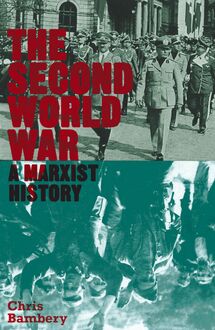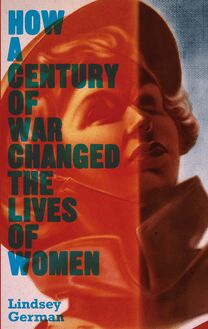How a Century of War Changed the Lives of Women , livre ebook
168
pages
English
Ebooks
2013
Vous pourrez modifier la taille du texte de cet ouvrage
Obtenez un accès à la bibliothèque pour le consulter en ligne En savoir plus
Découvre YouScribe en t'inscrivant gratuitement
Découvre YouScribe en t'inscrivant gratuitement
168
pages
English
Ebooks
2013
Vous pourrez modifier la taille du texte de cet ouvrage
Obtenez un accès à la bibliothèque pour le consulter en ligne En savoir plus
Publié par
Date de parution
06 février 2013
Nombre de lectures
0
EAN13
9781849648493
Langue
English
Poids de l'ouvrage
1 Mo
Lindsey German, one of the UK's leading anti-war activists and commentators, shows how women have played a central role in anti-war and peace movements, including the recent wars in Afghanistan and Iraq. The women themselves talk about how they overcame prejudice and difficulty to become valued members of the struggle. The book integrates this experience with a historical overview, analysing the two world wars as catalysts of social change for women. It looks at how the changing nature of war, especially the involvement of civilians, increasingly involves significant numbers of women. As well as providing an inspiring account of women's opposition to war, the book also turns a critical eye to contemporary developments, challenging negative assumptions about Muslim women and showing how anti-war movements are feeding into a broader desire to change society.
1. Women and the Great War
2. The Home Front 1939-45
3. In the shadow of the bomb
4. Vietnam and the liberation decade
5. From Greenham to the Gulf
6. A mass movement is born
7. War, liberation and Muslim women
8. Changes: war and women’s consciousness
9. Conclusion
Notes
Index
Publié par
Date de parution
06 février 2013
Nombre de lectures
0
EAN13
9781849648493
Langue
English
Poids de l'ouvrage
1 Mo
How a Century of War Changed the Lives of Women
Counterfire
Series Editor: Neil Faulkner
Counterfire is a socialist organisation which campaigns against capitalism, war, and injustice. It organises nationally, locally, and through its website and print publications, operating as part of broader mass movements, for a society based on democracy, equality, and human need. Counterfire stands in the revolutionary Marxist tradition, believing that radical change can come only through the mass action of ordinary people. To find out more, visit www.counterfire.org
This series aims to present radical perspectives on history, society, and current affairs to a general audience of trade unionists, students, and other activists. The best measure of its success will be the degree to which it inspires readers to be active in the struggle to change the world.
Also available:
The Second World War:
A Marxist History
Chris Bambery
A Marxist History of the World:
From Neanderthals to Neoliberals
Neil Faulkner
First published 2013 by Pluto Press 345 Archway Road, London N6 5AA
www.plutobooks.com
Distributed in the United States of America exclusively by Palgrave Macmillan, a division of St. Martin’s Press LLC, 175 Fifth Avenue, New York, NY 10010
Copyright © Lindsey German 2013
The Adrian Mitchell verse in Chapter 4 comes from ‘To Whom It May Concern’, included in the anthology Come on Everybody: Poems 1953–2008 , published by Bloodaxe Books, 2012. Reproduced with permission.
The right of Lindsey German to be identified as the author of this work has been asserted by her in accordance with the Copyright, Designs and Patents Act 1988.
British Library Cataloguing in Publication Data A catalogue record for this book is available from the British Library
ISBN 978 0 7453 3251 2 Hardback ISBN 978 0 7453 3250 5 Paperback ISBN 978 1 8496 4848 6 PDF eBook ISBN 978 1 8496 4850 9 Kindle eBook ISBN 978 1 8496 4849 3 EPUB eBook
Library of Congress Cataloging in Publication Data applied for
This book is printed on paper suitable for recycling and made from fully managed and sustained forest sources. Logging, pulping and manufacturing processes are expected to conform to the environmental standards of the country of origin.
10 9 8 7 6 5 4 3 2 1
Typeset from disk by Stanford DTP Services, Northampton, England Simultaneously printed digitally by CPI Antony Rowe, Chippenham, UK and Edwards Bros in the United States of America
Contents
Acknowledgements
Introduction
1 Women and the Great War
2 The Home Front, 1939–45
3 In the Shadow of the Bomb
4 Vietnam and the Liberation Decade
5 From Greenham to the Gulf
6 A Mass Movement is Born
7 War, Liberation and Muslim Women
8 Changes: War and Women’s Consciousness
9 Conclusion
Notes
Suggested Reading
Index
Acknowledgements
A number of people have helped me with this book. I would like to thank first the Barry Amiel and Norman Melburn Trust, which kindly helped to fund my research and writing. I am very grateful to them. I hope that in a small way it contributes to advancing ‘public education, learning and knowledge in all aspects of the philosophy of Marxism, the history of socialism, and the working- class movement’ – the trust’s aim.
I would also like to thank all those who agreed to be interviewed and to share their thoughts with me. It has been a great privilege to talk to them, especially to Billie Figg and Angela Sinclair, now both 90 and representatives of a truly remarkable generation. Those interviewed are listed below. The book could not have been written without them, although they may not necessarily agree with all the conclusions that I draw.
Neil Faulkner, Elaine Graham Leigh, Chris Nineham, Kate Connelly, Kate Hudson, Andrew Murray, Sara Farris, Nina Power and Michael Williams read and commented on all or part of the manuscript. Neil Faulkner also gave a detailed and effective ‘first edit’ of an early manuscript. David Castle and his colleagues at Pluto Press have been very helpful and encouraging, and understanding about deadlines. Elly Badcock compiled the index.
David Shonfield has been generous with his house in Italy, a beautiful and peaceful place to write, and has engaged in numerous stimulating conversations on the topic.
I would like to thank all my work colleagues at Stop the War for their help and patience and in carrying work while I was writing.
Finally, my thanks as always to John Rees, my partner and comrade, who helps me in more ways than I can possibly say.
The Women Interviewed for this Book
Pat Arrowsmith
Carmel Brown
Kate Connelly
Billie Figg
Rose Gentle
Penny Hicks
Tansy Hoskins
Kate Hudson
Joan Humphreys
Dahabo Isse
Helen John
Jenny Jones
Rania Khan
Sinead Kirwan
Henna Malik
Jackie Mulhallen
Nicola Pratt
Yvonne Ridley
Chanie Rosenberg
Elaheh Rostami Povey
Jane Shallice
Angela Sinclair
Rae Street
Carol Turner
Introduction
The Stop the War movement, which began over a decade ago in response to the War on Terror, has become the biggest mass movement in British political history. One of its most remarkable features has been the involvement of women of all ages, races and backgrounds who have been at its centre. Why did this movement become such a vehicle for women’s political action, and what does that tell us about the position of women today? To answer these questions we must look not just at the past few years, but at the changes that have taken place over the past century.
Women’s liberation and war have often been intertwined in modern history, with the atrocities of war making a dramatic impact on women’s role. The history of the two world wars is full of stories of women who broke through stereotypes, worked in unfamiliar jobs, acted with great courage, became feminists, rejected relationships with men and took up arms. Successive wars have shown not just women involved in wars – although in this era of total war it is impossible to ignore the direct involvement of civilians in war and the effect on them – but women taking an increasing part in opposing them.
It is almost 100 years since the world descended into the horror of the first of two world wars. It began in sunshine and patriotic fervour, endured four years of mud, misery, injury and carnage on an unprecedented scale, and ended in revolutions and social upheaval. The First World War was a watershed: it deposed kings and emperors, ushered in universal suffrage and workers’ revolution, and changed people’s attitude to war forever. Governments of the wealthiest countries have never again been able to preside over such carnage and the death of some ten million young men across Europe and further afield.
But if the war changed the lives of young men and their families, it also had a profound effect on women. By the end of the war they had experienced working in jobs previously reserved for men and been paid wages higher than they were able to earn in domestic service, the biggest single employer of women before 1914. Although they were denied access to some of these jobs when the war ended, they continued to work in greater numbers and in some of the new fields of work that were opening up. They had the vote, or at least some of them did (full female suffrage would have to wait another decade). They started wearing much more comfortable and unrestricted styles of dress. And while marriage and motherhood were still considered women’s main roles, the number of children that women had began to decline quite sharply.
The life-changing impact of the Second World War, just a generation later, was even more dramatic. Women worked in essential industries, joined the armed forces and many jettisoned ideas about chastity and taboos on sex before marriage with great enthusiasm. Again, while they were encouraged to return to the home, marriage and family after 1945, women embarked on careers and education which challenged the traditional stereotypes.
Modern industrialised warfare is fundamentally different. We now have wars of total attrition. Industrial mass production creates and sustains vast armies and unprecedented firepower, and results in unparalleled killing and destruction. It is qualitatively different from previous eras. At Waterloo (1815) Britain had 156 guns; at the Somme (1916) the British army had 1,400 guns, and fired nearly two million shells in just a few days. The Prussian army at Waterloo had 60,000 men; by 1914 the German army had 1.5 million men on the Western Front alone. One outcome of modern firepower was often stalemate and wars of attrition. Industrial output was decisive, mobilising not just soldiers but workers in war industries too. Women were crucial on the home front.
This book is an attempt to understand the relationship between women and war in Britain in the twentieth and twenty-first centuries. Unlike most of Europe during the Second World War, Britain escaped Nazi occupation, but it was nonetheless subject to heavy bombardment and high levels of government intervention, as well as conscription to create a war economy.
The Second World War shaped the lives of my generation, born in the postwar era of optimism, when people expected improvements in health, education and housing provision as a reward for the terrible years of war, death and dislocation our parents and grandparents had endured. The second half of the twentieth century offered more opportunities for women than at any time in history, and the basis for many of those opportunities was created in the first half of a century which witnessed not only two world wars, but also the worst economic crisis to date.
War has a terrible impact on all people, but increasingly on women as victims of injury, rape, displacement and death. But in Britain and a number of other countries it has also promoted women’s emancipation by breaking down oppressive social structures. Many of the great social changes from which my generation benef


